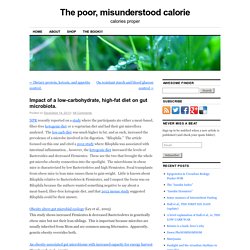

How chronic high fat food consumption causes gut problems - Hack your gut. With the renewed interest in the keto diet, many people regularly consume high fat food.

But just because something gives you short term benefit doesn’t mean that there are no long term consequences. Overall, if a person loses weight on keto and can’t do so on a regular diet, it’s probably great for them. Unfortunately, I don’t think people stick to the keto diet over the long term. Maybe they do it for a few months and diverge. Or maybe they do it on the weekdays and come off on the weekends. Ketogenic Diet and Microbiota: Friends or Enemies? How Ketogenic Diet Wreaks Havoc on Your Gut. Fiber and Colon Health On A Well-Formulated Ketogenic Diet: New Insights Question Its Role As An Unconditional Requirement - Blog. The Gut Microbiota Mediates the Anti-Seizure Effects of the Ketogenic Diet: Cell. Metabolic benefits of a low-carbohydrate diet on non-alcoholic fatty liver disease may be partly mediated by the gut microbiota. Low Carb Diet and Gut Health: Are we doing more harm than good? — Food Sense Nutrition. Low-carb diets are all the rage right now, and with good reason.
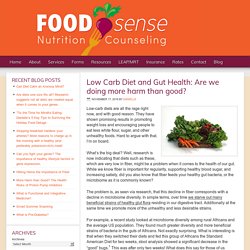
They have shown promising results in promoting weight loss and encouraging people to eat less white flour, sugar, and other unhealthy foods. Hard to argue with that. I’m on board. What’s the big deal? Well, research is now indicating that diets such as these, which are very low in fiber, might be a problem when it comes to the health of our gut. The problem is, as seen via research, that this decline in fiber corresponds with a decline in microbiome diversity. For example, a recent study looked at microbiome diversity among rural Africans and the average US population. This creates some cause for concern because research has shown that the health of our microbiome influences the health of the host.2 In other words, our personal health is influenced by the bugs living in our digestive tract. If you are one of those embarking on a low carb diet, don’t fret! Fruit: Choose the lower carb ones like berries, avocado, tomatoes.
Sorry low carbers, your microbiome is just not that into you. I recently posted a scatter plot (below) on Facebook/Twitter of preliminary metadata that we are accumulating as part of the American Gut project – which includes, among other things, a questionnaire of 50 + questions and a 7 day food journal.
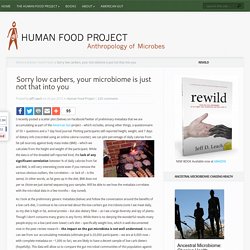
Plotting participants self-reported height, weight, and 7 days of dietary info (recorded using an online calorie counter), we can plot percentage of daily calories from fat (all sources) against body mass index (BMI) – which we calculate from the height and weight of the participant. While the data is of the dreaded self-reported kind, the lack of any significant correlation between % of daily calories from fat and BMI, is still very interesting (note even if you remove the various obvious outliers, the correlation – or lack of – is the same).
In other words, as fat goes up in the diet, BMI does not per se. (Note we just started sequencing poo samples. In response to Jeff Leach’s blog article: "Sorry low carbers, your microbiome is just not that into you” - Digestive Health Institute. Are High-Fat Diets Bad for the Microbiome? Those in the Paleo and ancestral health communities have a tendency to follow high-fat, low-carb diets.

After all, when you cut out grains, you naturally cut out a lot of carbs. But are there downsides? What happens to our microbiome on a high-fat diet? If you’ve been following my work for a while, you won’t be surprised when I say, “It depends.” You Are What Your Bacteria Eat: The Importance of Feeding Your Microbiome - With Jeff Leach.
The effects of fasting and starvation on the microbiome — The American Microbiome Institute. Researchers at St.
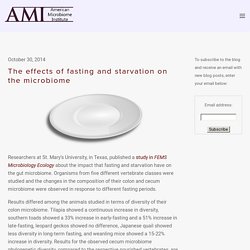
Gut Microbes Need Fiber, Too. WIKIMEDIA, POGREBNOJ-ALEXANDROFFHumans have coevolved with microbes for thousands of years, but the profiles of the gut microbiome in those living on a Western-style diet and humans living hunter-gatherer or mixed subsistence lifestyles are vastly different.
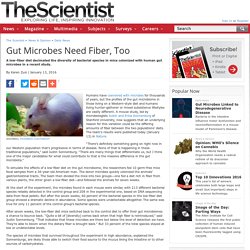
A mouse study, led by microbiologists Justin and Erica Sonnenburg of Stanford University, now suggests that an underlying reason for this variation could be the differing amounts of fiber between the two populations’ diets. The team’s results were published today (January 13) in Nature. “There’s definitely something going on right now in our Western population that’s progressive in terms of disease. None of that is happening in these traditional populations,” said Justin Sonnenburg. A fibre-deprived diet may degrade the colonic mucus barrier and promote enteric pathogen infection in mice - Gut Microbiota for Health. Dietary fibre from plant-based foods is the most common fuel for some bacterial species in the gut microbiota and in some contexts has been shown to play a key role in protecting the host against immune-mediated diseases such food allergies and even neurological disorders.
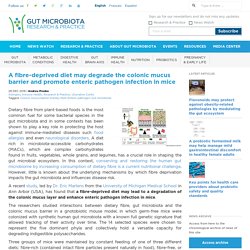
A diet rich in microbiota-accessible carbohydrates (MACs), which are complex carbohydrates found in fruits, vegetables, whole grains, and legumes, has a crucial role in shaping the gut microbial ecosystem. Low Carb Diets and the Gut. The human diet has an enormous impact on the quantity and quality of bacteria in the gut.

The Ketogenic Diet & Gut Health - GLOBAL HEALING EXCHANGE. Why We Are Suffering From Unhealthy Guts?

The real issue is that good health starts with a healthy gut. Over 70% of your immune system is in your gut. More than likely, yours has been compromised by a diet consisting of sugar, chemicals, additives, artificial sweeteners, antibiotics and pesticides. These are only a few of the factors that work to destroy the good bacteria we need in our intestinal tract. Having a healthy gut is key to proper digestion, absorption of essential nutrients, and becoming a fat burning machine.
How Does This Affect Us? When poor diet and antibiotics strip that good bacteria from your intestines, it gives bad bacteria an opportunity to thrive. Some Symptoms Related To An Unhealthy Gut: BloatingAcneFatigueJoint painFood intoleranceAllergiesAutoimmune diseaseHair lossWeight loss or weight gainTrouble losing weightBrittle nailsDiarrhoea/constipationSugar cravingsHypothyroidismMalabsorptionBlood sugar dysregulationMigrainesHypoglycaemia.
Impact of a low-carbohydrate, high-fat diet on gut microbiota. NPR recently reported on a study where the participants ate either a meat-based, fiber-free ketogenic diet.
